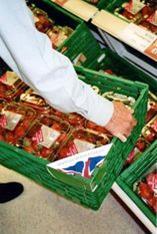
Recently crowned Re:fresh Fresh Produce Retailer of the Year, Waitrose is now exploring the potential to develop additional niche markets within a sector that still continues to show phenomenal year-on-year growth. This month will also see the arrival of a triple pack of raspberries, blackberries and blueberries, which will take its place on the shelf alongside culinary and dessert gooseberries, red currants, blackcurrants and even more obscure speciality lines, such as tayberries.
Nicki Baggott, the retailer’s soft-fruit buyer, reveals that in the last three months Waitrose strawberry sales have risen by 19 per cent, which has been accompanied by an increase in overall market share.
“Customers just can’t get enough,” she says. “Everyone loves strawberries and they are one of the biggest impulse buys. English fruit is recognised as the best in the world because of the skills of the producers and the flavour which is enhanced by the climate.”
The decision of Waitrose to concentrate entirely on UK fruit between May and September was largely based on these criteria. “English strawberries are still recognised as something very special, where seasonality counts,” adds Baggott.
The main variety, which as elsewhere is Elsanta, is supplemented later in the season by varieties less common on the high street Florence and Everest.
“This switch is necessary,” explains Baggott, “because of the natural dip in the production season at a time when demand continues unabated. However, the overriding factor remains that all fruit throughout the year must consistently deliver both taste and appearance.”
While the expansion of its share of the retail soft-fruit market is impressive, the bare statistics that illustrate the hold Waitrose has on the category’s organic offer are arguably even more so. “While the organic soft-fruit season begins later than that of conventionally grown crops, we have seen phenomenal growth,” she says. “We estimate that at present we account for 35 per cent of all organic soft-fruit sales in the UK.”
Waitrose’s support of the domestic industry is strongly reinforced in store. Last month, for instance, it unveiled distinct patriotic tray-talkers emblazoned with the Union Jack, which were designed to clip neatly onto the green IFCO trays used to display products on shelf. Grower posters identifying some of the most respected names in the industry such as Harry Hall and Marion Regan, who have been supplying Waitrose for many years, personalise this relationship in the eyes of the customer.
As an increasing number of stores are being refurbished with new temperature controlled fitments, berries are able to shine through bright and bold displays.
Regular in-store tastings underscore the visual message, and are particularly aimed at encouraging secondary shoppers to stop and try Waitrose fruit and come back for more throughout the season.
“Another key aspect in our marketing plans is to strengthen communication ties through category leadership - allowing suppliers to have a clear understanding of our retail requirements,” Baggott says. “At the same time, we benefit by becoming more knowledgeable about production.”
This link is re-enforced, not just by the seasonal news that appears in Waitrose publications such as Selections, but also visits by retail partners to the fruit farms to experience the harvesting process first hand.
While the strawberry market is relatively mature, Baggott is even more enthusiastic about the untapped potential for raspberries. Based on the latest independent statistics she reveals Waitrose significantly over-trades in relation to its size, and accounts for some 13.5 per cent of all raspberry sales at retail.
This is even more remarkable, she admits, as the growth potential of the sector is recognised by all retailers and the desire to expand raspberry sales is high on the priority list for many soft-fruit buyers.
“With greater interest in healthy food, fresh fruit snacking and drinks like smoothies, raspberries fill a natural place,” she adds. “Because many Waitrose customers also are keen on food preparation and cooking, this adds a further dimension.”
And in the future there is the potential of extending the season, which will bring heavier volumes. “Many of our growers have planting programmes to increase the supply of other summer berries which at one point were in the decline,” she says. “Others are giving serious consideration to the potential of blueberries, despite the fact that it takes at least three years for bushes to begin to mature.
“What we all share is the confidence to grow the market.” Expect Waitrose to punch above its weight in soft-fruit circles for many years to come.



